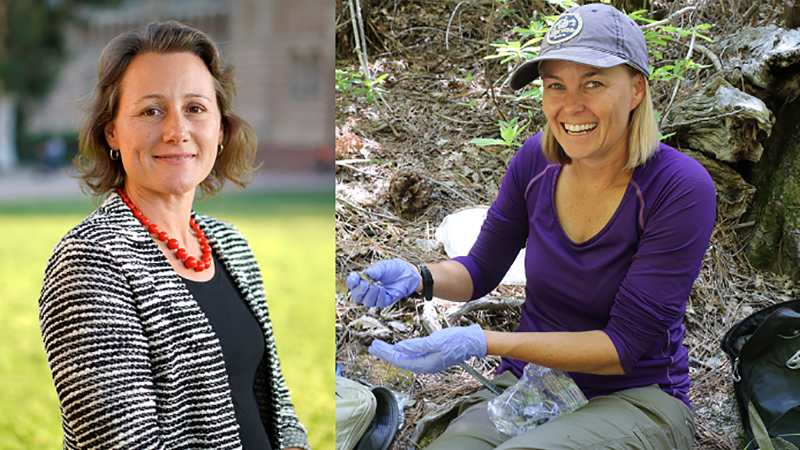
Counting the cost of climate change: It’s all about numbers for UCLA teaching fellowship winners
by Karen A. Lefkowitz
Professors Kathryn Bickel Goldman and Debra Shier are practiced adding machines. Goldman calculates greenhouse gas emissions and Shier tallies wildlife populations. Both can add a new designation to their columns as recipients of the 2016 Pritzker Environment and Sustainability Education Fellowship that recognizes instructors for their contributions to academic programs.
Carbon accounting, wherein output is quantified so organizations can manage climate change impacts, is a field Goldman began specializing in during her time in the nation’s capital with the U.S. Department of Agriculture and Environmental Protection Agency. The bookkeeping of emissions found Goldman contributing to the Intergovernmental Panel on Climate Change assessment report that won a Nobel Peace Prize in 2007.
In addition to wrangling students, animal ecologist Shier keeps company with Pacific pocket mice and Mountain yellow-legged frogs – endangered species native to California and critical members of their ecosystems. Through the San Diego Zoo’s Institute for Conservation Research, Shier cares for species impacted by human activity, habitat loss and climate disruption. Using captive breeding programs, she rehabilitates then moves animals back into the wild to restore populations.
This year, Goldman and Shier served as advisors for Environmental Science Practicum projects, guiding senior students as they conducted original research to solve regional environmental challenges over the course of a year. Goldman previously supervised a team that partnered with the California Governor’s Office to assess local progress on climate action; this time she worked with a group analyzing co-benefits of greenhouse gas registries, looking at dairy farms with technology to capture methane gas. The study concluded that in addition to limiting the release of deadly methane into the air, the farm benefited from odor reduction and financial savings.
“Climate change is a challenging puzzle and it’s going to require a big strong team of innovators to work it out and come up with solutions. I already enjoy what I’m doing and working with undergraduates and watching them mature through the Practicum is icing on the cake,” said Goldman.
Shifting focus to larger animals, Shier’s Practicum team studied the effectiveness of Orange County wildlife corridors that function as passage ways for coyotes, bobcats and other critters living on the urban edge. Cameras set up by the students tracked the wildlife’s movement, capturing data to inform improvements that will help maintain genetic diversity.
“I love teaching and it’s not something I get to do in my regular full-time job. Watching students figure things out in the field was a lot of fun for me and an experience that can change the trajectory of their career,” said Shier.
Nominated by faculty members based on their expertise and scholarship, Goldman and Shier were selected for the award based on their commitment to providing innovative, forward-thinking education focused on the environment and sustainability. This annual recognition is made possible through an endowment from the Anthony and Jeanne Pritzker Family Foundation.
